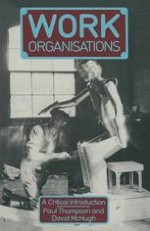1990 | OriginalPaper | Chapter
Management, Power and Control
Authors : Paul Thompson, David McHugh
Published in: Work Organisations
Publisher: Macmillan Education UK
Included in: Professional Book Archive
Activate our intelligent search to find suitable subject content or patents.
Select sections of text to find matching patents with Artificial Intelligence. powered by
Select sections of text to find additional relevant content using AI-assisted search. powered by
We saw in Chapter 2 that the first quarter of this century marked the emergence of professional management as a social force, specialist occupational category and with a set of distinct work practices. This development was integral to changes in the organisation of capitalist production, with the modern bureaucratic enterprise increasingly based on the joint stock company, often in the new multidivisional form with its separation of ownership and management. In this type of structure, middle managers headed autonomous divisions which integrated production and distribution by coordinating flows from suppliers to consumers in the more clearly defined markets (Chandler, 1977). Such divisions administered their functional activities through specialist departments. All this encouraged the professionalisation of management and the rapid spread of administrative techniques. Management thought became intimately linked to the appearance of a distinct occupational grouping; organisational theory being used as a resource to understand the complexities of the large-scale organisation and management’s role within it.
